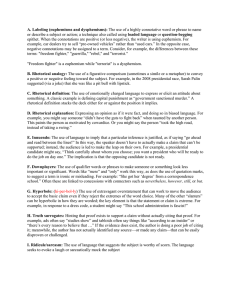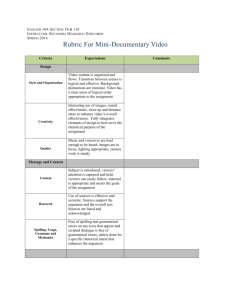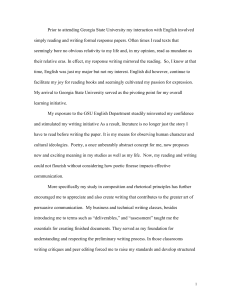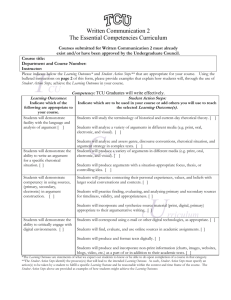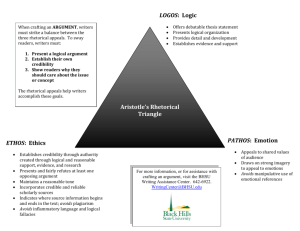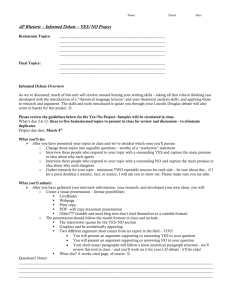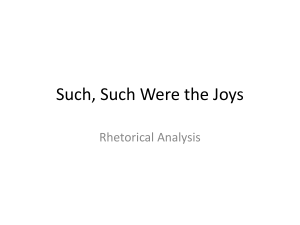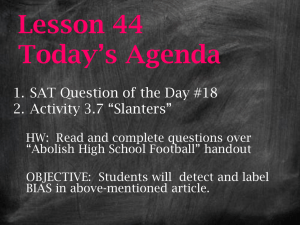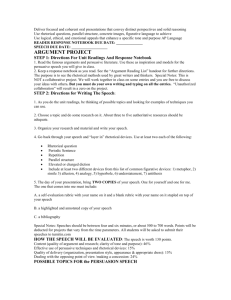BIAS - Campbell County Schools
advertisement
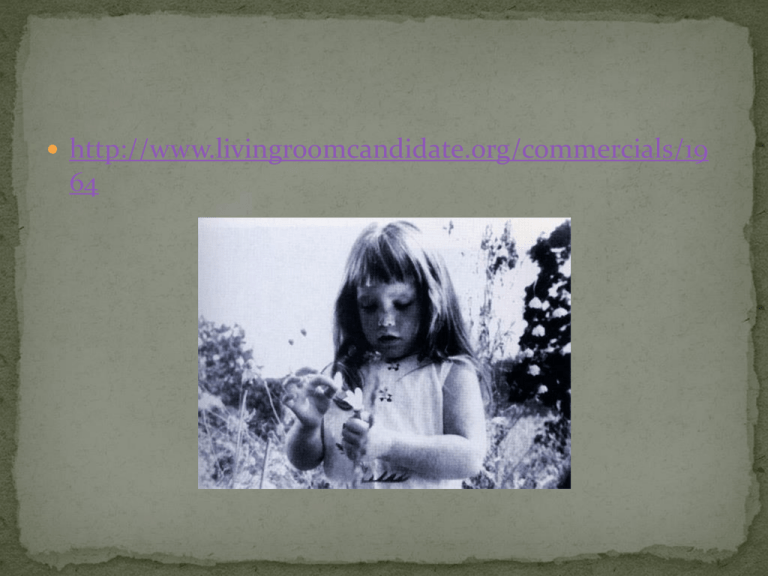
http://www.livingroomcandidate.org/commercials/19 64 Labeling Rhetorical analogy Rhetorical definition Rhetorical explanation Innuendo Downplayers Hyperbole Truth Surrogates Ridicule / Sarcasm EUPHEMISM positive connotative word or phrase to make topic seem less harsh DYSPHEMISM negative connotative word or phrase to make topic seem more harsh Freedom fighter vs terrorist vs guerilla vs rebel Euphemism: His neighbor passed away. Dysphemism: His neighbor croaked Uses a figurative comparison (sometimes a simile or metaphor) to convey a positive or negative feeling towards a subject McCain Ad Palin Speech Obama response “The environment needs George Bush like farmers need a drought” The use of emotionally charged language to express or elicit an attitude about something Capital punishment defined as “government sanctioned murder” “…America is not the crude stereotype of a self- interested empire.” ~Barack Obama~ Expressing an opinion as if it were fact He didn’t have the guts to fight back VS he took the high road instead of taking a swing. “People living illegally in our country,…, are taking advantage of our schools and welfare programs, stealing our jobs, and instigating crime.” ~Alexandra Le Tellier, LA Times~ The speaker makes an unsupported claim, leading the audience to believe something by implying or hinting at it. We need a leader who is ready today. Wording to make someone or something look less important or significant (Often uses a qualifier: Mere, only, so called, only, etc….) “Yes Dad, I had an accident, but really it’s just a dent” Use of quotation marks may also suggest irony or misleading: She got her ‘degree’ from a corresponding school An extravagant overstatement Can work to move the audience to accept the basic claim even if they reject the extremes of the word choice Hinting that proof exists to support a claim without actually supporting it. “studies show”, “according to an insider”, “there’s every reason to believe that…..” If the evidence does exist, the author does a poor job of citing it. We have every reason to believe that the football stadium will be ready for next season. The use of language suggests the subject is worthy of scorn. The language seeks to evoke a laugh or sarcastically mock the subject Supreme Court Justices UNIT 2- SPRINGBOARD LEVEL 6 Fallacies are false or misleading arguments. Why Do I Need to Know These? You can point them out in a discussion thereby focusing the issues where they belong while exposing error. You will notice them when people are trying to persuade you and therefore be able to poke holes in their argument. Attacking the individual instead of the argument. abusive attack the person instead of the argument ("Only a cold-hearted Scrooge would cut this program!") circumstantial attacking the circumstances of the person ("How can you be against relaxing immigration policies. Your grandparents came over from Italy!") tu quoque ("you, too") AKA "practice what you preach." ("Why should I follow this Java style guide? You write pretty sloppy code yourself!") The hearer is urged to accept the argument based upon an appeal to emotions, sympathy, etc. Example: You owe me big time because I really stuck my neck out for you. Example: Oh come on, I've been sick. That's why I missed the deadline. the hearer is urged to accept a position because a majority of people hold to it. Example: The majority of people like soda. Therefore, soda is good Example: Everyone else is doing it. Why shouldn't you? reduce complex issues to black and white choices. Example: Either we go to Panama City for the whole week of Spring Break, or we don’t go anywhere at all. Example: Your grades show you just aren't trying. Either study more, or drop out of school! The attempt to endorse or disqualify a claim because of the origin or irrelevant history of the claim Example: The Nazi regime developed the Volkswagen Beetle. Therefore, you should not buy a VW Beetle because of who started it. Example: America will never settle down; look at the rabble-rousers who founded it. a fallacy with the following form. 1. A occurs before B. 2. Therefore, A is the cause of B. Example: Eating five candy bars and drinking two sodas before a test helps me get better grades. I did that and got an A on my last test in history. Example: The picture on Jim's old TV set goes out of focus. Jim goes over and strikes the TV soundly on the side and the picture goes back into focus. Jim tells his friend that hitting the TV fixed it. The introduction of a topic not related to the subject at hand. Example: I know your car isn't working right. But, if you had gone to the store one day earlier, you'd not be having problems. Example: I know I forgot to deposit the check into the bank yesterday. But, nothing I do pleases you. suggests that one step will inevitably lead to more, eventually negative steps. Example: We have to stop the tuition increase! The next thing you know, they'll be charging $40,000 a semester! Example: You can never give anyone a break. If you do, they'll walk all over you. The leap to a generalized conclusion based on only a few examples. Example: Even though it’s only the first day, I can tell this is going to be a boring year. Example: On my layover in Paris, I met one French person- now I know that ALL French people are rude. An appeal to fear in place of logic Example: A candidate for president says “Electing my opponent will open the door for new terrorist attacks.”
